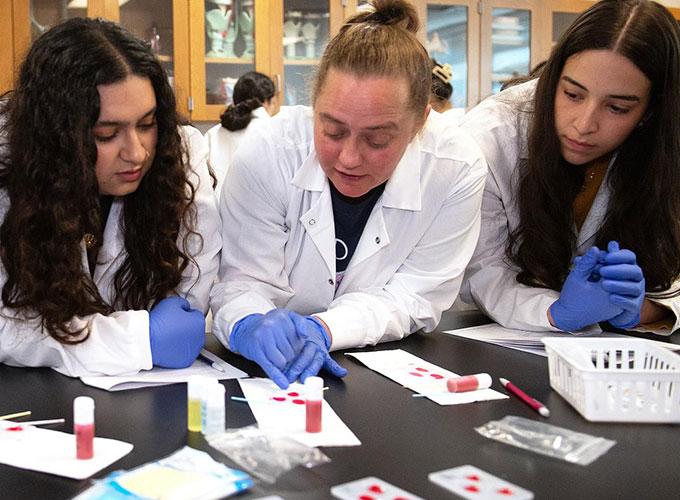Lab coats. Check. Gloves. Check.
Georgia Gwinnett College (GGC) students learned about the importance of blood typing and then went into action, putting their knowledge to work.
Dr. Victoria Bali, assistant professor of biology, recently taught her students how to type blood, a follow-up on learning about the immune system. Her students were tasked with determining the blood type of four patients. To do this, the students worked with samples of synthetic blood.
“I stress the importance of matching correct donors and recipients for transfusions and understanding mismatch reactions,” Bali said. “The immune system recognizes foreign substances and will defend the body by attacking them. That’s why accurate blood typing is critical – so your immune system does not attack the new blood you are receiving.”
The transition of learning about the body’s immune system to blood typing is foundational.
“One way the immune system defends the body is by producing antibodies that target these foreign substances,” she said. “We use this property of the immune system to correctly identify a person’s blood type.”
Part of her lecture included showing her class why it’s important to understand the different blood types. Her students learned that the universal donor is O-negative and the universal recipient is AB-positive. Simply put, that means that people with O-negative blood can donate to all blood types, which is why the demand is high. People with AB-positive blood can receive from all blood types.
“Dr. Bali’s lecture helped me to work with my lab partners to easily identify the different blood types we had,” said Sherika Wilkerson, a Lawrenceville native and senior studying nursing. “This is important to know so that patients I’m helping receive the correct blood.”
For Rame Muner, a junior who wants to study nursing, the lecture and lab are knowledge he’ll need for his career.
“Receiving the correct blood type is lifesaving,” he said.
According to the National Institutes of Health, if a recipient received mismatched blood, reactions from the immune system can range from hemolysis, the destruction of red blood cells, fever and back pain. In severe cases, it can lead to kidney failure and even death.
Local hospitals depend on donations to help their patients in need of care ranging from traumas and surgery to childbirth. The supply of blood is also used to treat patients battling diseases that range from cancer to Sickle Cell.
According to The Association for Blood Donor Professionals, Type O blood is the most common and in the highest demand. This is because those with an O-positive blood type can donate to any positive blood type, which accounts for over 80% of the population.

